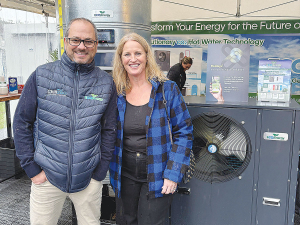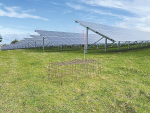A Taupo company says it's the first to bring CO₂-powered water heating technology to New Zealand dairy sheds, helping farmers cut energy costs by up to 85%.
“We saw a real opportunity to help dairy farmers manage rising power costs while protecting milk quality and meeting sustainability goals,” says Nick Papa, co-founder of Eco2Energy.
“Our system uses a natural CO₂ refrigerant to produce hot water up to 90°C, while significantly cutting energy use. It’s proven technology overseas, and we’ve adapted it to suit the needs of Kiwi dairy farms.”
CO₂ water heating is already widely used in Europe and Japan for food processing and commercial applications, but Eco2Energy is the first to introduce it to New Zealand’s dairy sector.
“Most farms can expect a payback time of around 2.5 years, depending on their current energy use and system setup,” says Papa.
“The Government’s new Investment Boost tax incentive could also help farmers invest in technology like this.”
Unlike traditional electric systems, Eco2Energy’s CO₂ technology gets more heat from less power, delivering up to 3.9kW of heat using just 1kW of electricity.
Read More:
It runs on natural CO₂ refrigerant, which is not only clean and efficient but also better for the environment.
The system works in a closed loop, where the CO₂ refrigerant recycles energy as it goes. This means no waste, no emissions, and consistently strong performance.
With calving underway and new season milk flowing, hot water might not be front of mind, but it plays a big role in milk quality and compliance.
“It’s one of those things that doesn’t always get attention until there’s an issue,” says Mike Donovan, head of business development. “But when it comes to cleaning and hygiene, consistent hot water is essential.”
Donovan spent 26 years dairy farming and 18 years with Ecolab helping farmers improve milk quality through better hygiene systems. He knows just how critical reliable hot water is to maintaining milk quality.
“If your plant or silo wash doesn’t reach the right temperature, you risk leaving behind residues or bacteria that can compromise the next milking. That can lead to costly milk quality downgrades.”
“Getting it right helps protect milk quality, keeps things running smoothly, and takes one more pressure off during a busy time like calving.”
Positive Feedback
There was strong interest in Eco2Energy’s system at this year’s Mystery Creek Fieldays. Many farmers were surprised by how much of their power bill goes into heating water and many hadn’t come across CO₂ technology before.
Eco2Energy’s technology is now being used on farms across the South Waikato and Central Plateau, with promising results. Farmers are getting consistent 85–90°C hot water when they need it, even during peak times like morning milking.
Early feedback shows improved wash performance and noticeable energy savings compared to traditional setups.


















